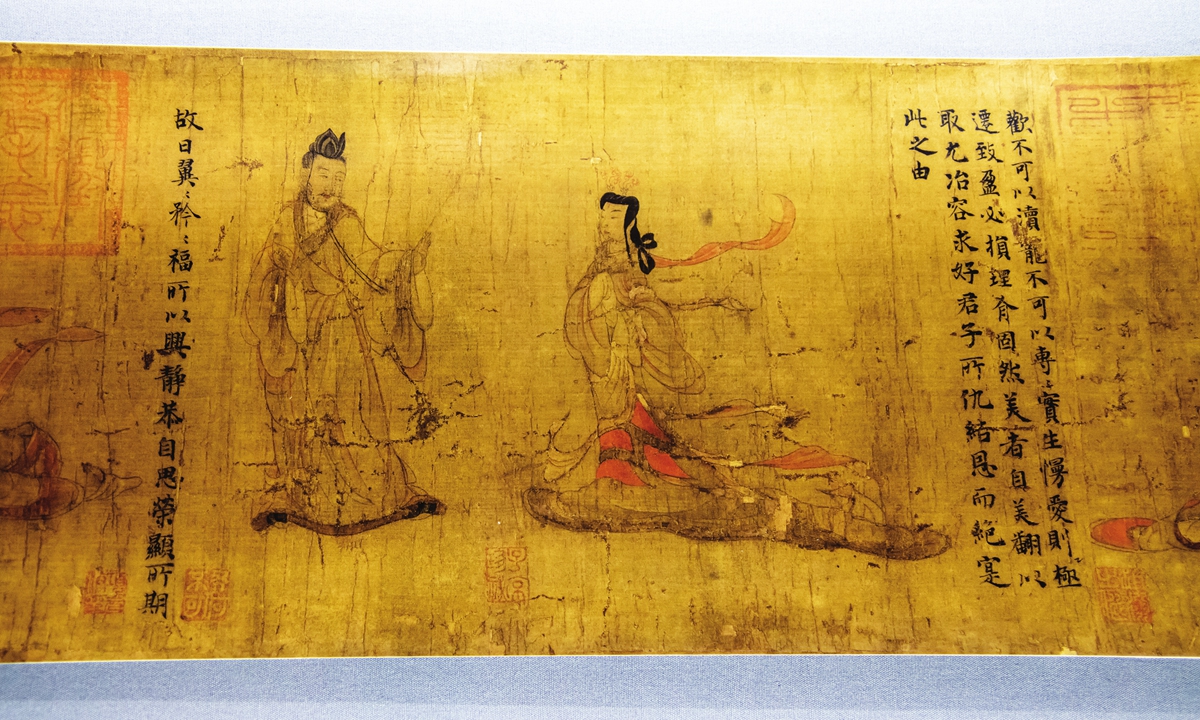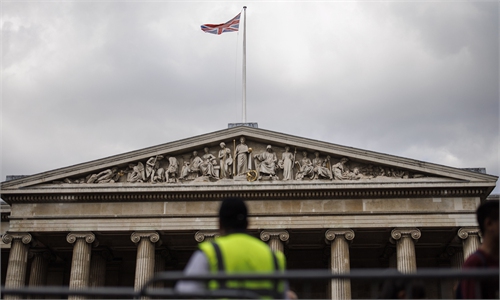
A Chinese artifact collected by the British Museum. Photo: VCG
Why is the British Museum refusing to return Chinese artifacts to China?The answer is it's not, or, to be accurate, it can't. Under a British law passed specifically to allow the "venerated" institution to retain looted, stolen and otherwise misappropriated items, the people in charge of the museum are forbidden from returning almost anything to its land of origin.
Sometimes nicknamed the World's Museum because of the enormous collection of 8 million objects it keeps under its roof, the British Museum has recently received some negative media coverage after discovering that more than 2,000 treasures had been stolen.
The only way to change this unseemly hoarding habit is to change the law, and that would require the cooperation and the will of elected legislators. In other words, this problem is not an archaeological one but a political one, and the only way to solve it is not to persuade museum officials to change their minds, but politicians.
If the solution is a political one, perhaps the museum's newly appointed chairman, former Tory chancellor George Osborne, could use a few of his former political contacts in government to consider the process.
Perhaps British Foreign Secretary James Cleverly can offer some insight during his visit to China this week. He is said to come with the intent of restoring goodwill between the two countries. One would have thought a good way to encourage good relations between London and Beijing might be to offer to return those Chinese artifacts to where they belong - China.
Coincidentally, there is currently an exhibition about China at the British Museum which has attracted enthusiastic reviews. Among the displays are often everyday objects from the past to bring to life the story of people's daily existence in China, thus creating a picture of change and development over time. Sometimes visitors will be taken aback by the starkly, even brutally honest exhibit - for example, an old photograph of a British-owned opium factory in China with a stack of 300,000 cakes of the deadly drug ready to flood the domestic market. It shows the British Empire as a drugs racket. In this way, many British people may learn for the first time about how their country's relationship with China began as one of plunder, exploitation and colonialism.
When it forced itself on China during what became known as the savage Opium Wars, it began a century of shame which has left deep scars in China. It may be shocking for visitors to the museum to learn that this humiliation came to an end only when the British finally left Hong Kong, the land which they effectively stole and over which they had ruled like foreign emperors. It is not clear if any of the objects currently on display at the museum's exhibition China's Hidden Century are among those which China would like returned.
While it is clear that museums can play a valuable role in helping people to understand the world around them and the context behind many of today's international relationships, there is no reason for these artifacts to be held by a country which did not create them. Those who argue otherwise might consider whether this is not simply a form of 21st century imperialism. There can be no justification for retaining what does not belong to you, and merely possessing something does not confer ownership.
It would be patronizing on a level worthy only of an ex-colonial power to suggest only Britain knows how to care for and look after such items (an argument which has been used in the past, for example, to deny Greece the return of the Parthenon marble sculptures removed from the Acropolis of Athens in an act of 19th century vandalism by the English lord Elgin, and transported to a private museum in London, where they became known as the Elgin marbles).
If Elgin was effectively a looter, what are we to call those who refuse to return the carvings? What are we to call those who refuse to change an unjust and unjustifiable law which was passed not centuries ago but in living memory? The British Museum Act of 1963 prevents the organization's board of trustees from returning any object in the collection unless it is a duplicated, damaged and no longer of public interest. Other museums in the UK are prevented from repatriating objects by an even more recent statute, the National Heritage Act 1983.
The problem is that some people actually regard these objects as their property, having been part of their cultural landscape for so long. Rather bizarrely, one cultural expert has said that the original intention of the laws was not to hold on to what is not ours in Britain, but to facilitate the administration and safekeeping of the museum's collection. That may be so, but it is ironic that the British Museum does not call its curators "curators" but "keepers."
It is reminiscent of a British children's playground idiom "finders, keepers, losers weepers," which means that a person can keep what he or she has found and does not need to give it back to the person who has lost it. But that is the mind-set of a child. Britain needs to start acting like a grown-up and change its laws which allow some of its most respected institutions to stain their own reputations by selfishly stockpiling pirated treasures.
The author is an independent researcher and analyst with an interest in China. opinion@globaltimes.com.cn

